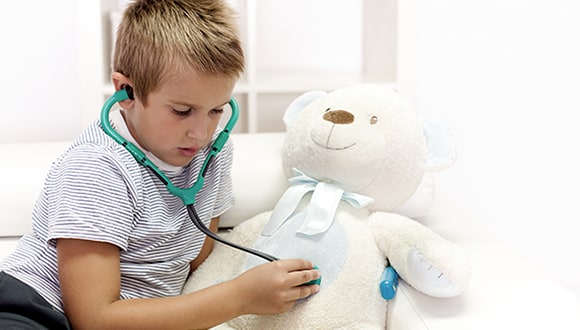Preparing your child for hospital
Here’s how to make the hospital experience less stressful for you and your child.
Helen Foster
October 2017
Every year around 670,000 Australian children under 14 are admitted to hospital for at least a night and around 3 million more visit for consultations, procedures or in an emergency.
When Kelly MacDonald’s 2-year-old daughter Ava had to go to hospital, she expected the experience to be difficult.
“Thankfully, Ava only had to go in for the day to have grommets put in, but it was still pretty worrying,” says MacDonald, a mum of 2 from the Central Coast, NSW.
“The thing I really wasn’t expecting was how long she would cry for when they put her under anaesthetic – the nurses told me she was already out, but she was still moving and crying and I found that quite hard.”
The hospital had given them the mask the anaesthetic is given through to play with while they waited to go in to surgery and they’d been practising on Ava’s favourite Piglet toy.
“We actually had more trouble getting her to wear the hairnet she had to put on,” says MacDonald. “The mask was strawberry-scented so she didn’t mind that.”

Explain what’s going to happen
Talking about the procedure before and using small strategies like scenting the anaesthetic mask are just some of the ways a hospital may help to make the experience less scary for young children.
“But there’s also a lot parents can do at home to prepare them,” says children’s therapist Kirsty Nauth-Misir from Sydney Children’s Hospital in Randwick. “The most important thing to do is to tell them where they’re going and a bit about what’s going to happen.
“For most children over 6, we suggest doing this a week or 2 beforehand so they have time to process the idea and ask any questions. If children are younger, or very anxious, leave it until a day or 2 beforehand.”
Some common concerns that might come up include the idea that they might have to stay in hospital forever and confusion as to how something that may hurt is going to help them.
Encourage questions
If your child has questions you can’t answer, using books designed to explain medical procedures like those in the Little Parachutes range can help.
“It also helps to do some medical play – such as bandaging a favourite toy or buying a toy medical kit so they have their own stethoscope,” says Nauth-Misir.
You can also ask for advice from the educational or play therapy unit at the hospital, some of which will offer familiarisation visits too.
Pack familiar objects
When you’re packing for hospital, it’s a good idea to bring your child’s favourite toys, comfort blankets or other possessions with them. This will help them feel more comfortable in an unfamiliar environment.
Admission statistics show the average length of a hospital stay for children is 2-3 days, but “if children are coming in for longer they can also bring their own pillowslips or doona covers”, says Nauth-Misir.
Stay with them when you can
When treatment involves simple day procedures like inserting grommets or removing tonsils, parents are often encouraged to stay with their children for as long as possible before and after the procedure.
“I stayed with Ava right until she went under and was then given a buzzer that alerted me as soon as she woke up,” says MacDonald.
Don’t forget both of you will spend a lot of time waiting around, so bring plenty of things to keep your minds busy. If your child does have to stay overnight, in most cases you’ll be allowed to stay with them (although in emergency cases there may only be a chair available to sleep in).
“The best advice I can give to worried parents is to ask questions. The more you know the less there is to worry about,” says Nauth-Misir. Each hospital has its own policies regarding parents staying, siblings visiting and what you can bring from home, so it’s best to find out what they are early on.
As it can be hard to think clearly when you’re worried, the Association for the Wellbeing of Children in Healthcare provides a helpful booklet listing all the questions you might like to ask.
Related Articles
PREPARING FOR HOSPITAL
Going into hospital can be a source of anxiety. Understanding your procedure can provide peace of mind.
THE ANTI-VACCINATION MOVEMENT: MYTHS VS FACTS
It’s a divisive, and emotive, topic. We track the history of the anti-vaccination movement and the potential consequences of under-vaccination.
FIRST AID BASICS WE SHOULD ALL KNOW
Accidents happen. Do you know how to help someone who’s injured?
8 WAYS TO KEEP YOUR KIDS ACTIVE
Tearing the children away from their screens is easier than you think.